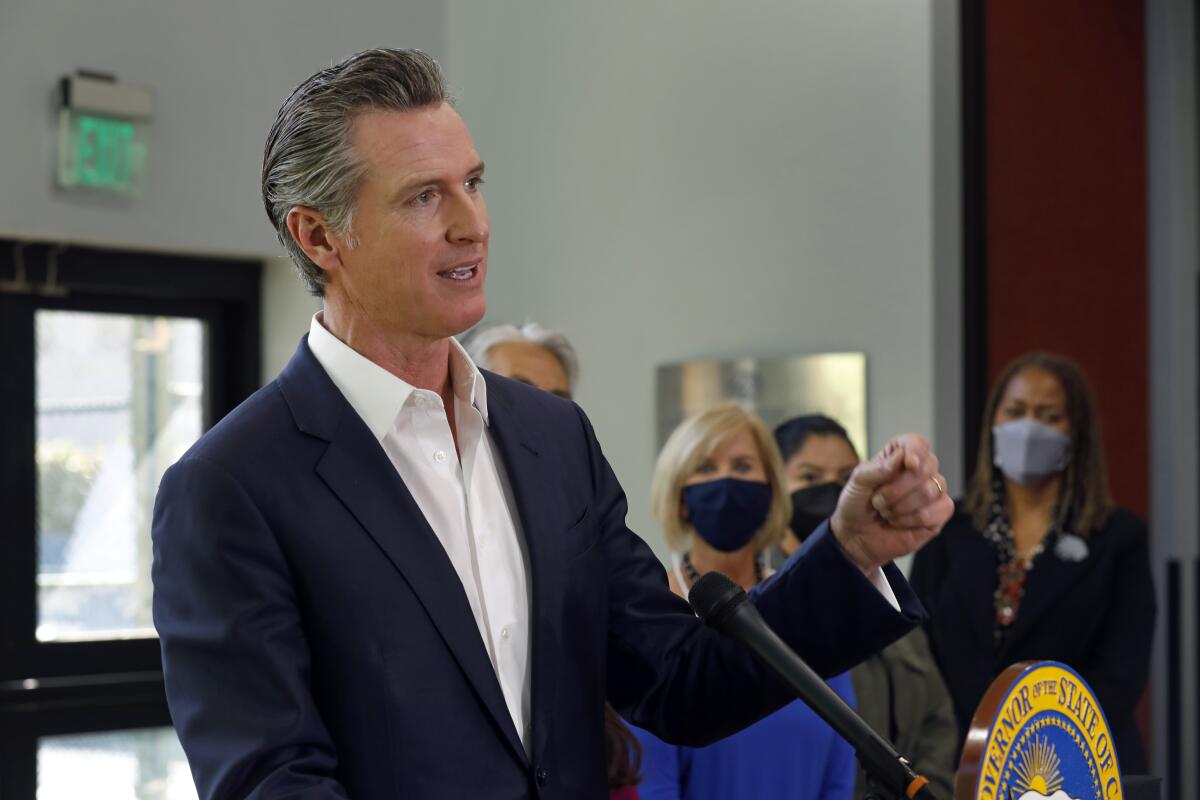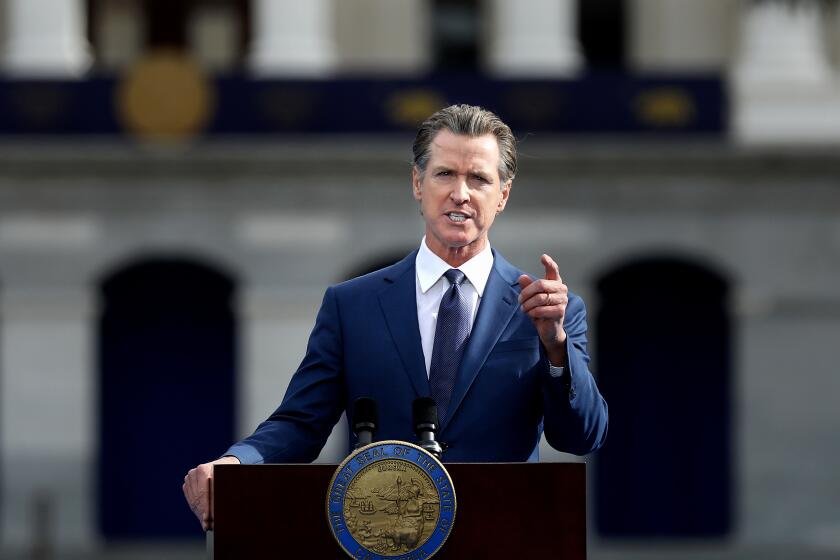How Newsom fell short of the oil penalty he wanted but still scored a political win

Gov. Gavin Newsom made a clarion call last fall for a special legislative session to penalize the profits of California oil companies.
The narrative, woven into news articles across the country, nearly wrote itself: The Democratic governor was launching yet another offensive in his war with Big Oil.
The battle, however, didn’t go as planned.
State lawmakers in his own party balked at his idea to cap the industry’s profits. In legislative hearings, some said they found no “smoking gun” confirming Newsom’s allegations of intentional price-gouging.
The final version of the bill focused on demanding more transparency from the industry. Instead of enacting a cap and penalty on oil refinery profits, Newsom and lawmakers gave state regulators the ability — but not a mandate — to do so in the future. Consumer advocates have celebrated the new law as a groundbreaking tool that could keep gas prices from escalating.
But even though the law falls short of the policy he initially said he wanted, it still gives the governor a political victory over the oil industry. The law allows Newsom to position himself as a cutting-edge leader who scored a win against a politically powerful industry that many progressives view as a bogeyman.
At a bill-signing in the Capitol on Tuesday, Newsom stood alongside Democratic lawmakers and hailed their cooperation as he took another dig at the petroleum industry. He argued that the final legislation is stronger than his original idea because it creates a new division within the California Energy Commission to act as a watchdog over oil companies.
“Finally, we’re in a position to look our constituents in the eye and say we now have a better understanding of why you’re being taken advantage of,” Newsom said.
“There’s a new sheriff in town in California, where we brought Big Oil to their knees. And I’m proud of this state.”
Yet Newsom also acknowledged that it would take time for Californians to feel the effects of the law: “Nothing is going to happen in the short term,” he said. “Gas prices are not going to drop immediately.”
The California Legislature sent Gov. Gavin Newsom a bill to increase transparency in the oil industry and require refiners to report more information to the state.
David McCuan, chair of the political science department at Sonoma State, said the special session is emblematic of Newsom’s strengths and his weaknesses.
Newsom has a tendency to try to “go it alone” and drive an agenda before he’s crafted a policy, which often forces him to backpedal, McCuan said.
When the governor announced in October his intent to call a special session in December, he told reporters he was still getting his “ducks in a row” on what he then described as a plan to pass a tax on oil companies.
Yet even as he jumps in front with political statements that lack policy details, Newsom has shown a knack for generating headlines and getting ahead of other politicians.
His well-timed words announcing the special session garnered attention across the country. The governor laid blame on the oil industry, just a month before his reelection, as Golden State voters were steamed over near record-high gas prices that topped $6 a gallon.
“This is the symbolic politics over substantive policies,” McCuan said of Newsom’s special session.
Newsom’s aides disagree with criticism that the governor retreated. The legislative process, they argue, worked as intended and resulted in the best policy possible. The new plan also gives more power to the Energy Commission and all five members have been either appointed or reappointed by the governor.
After reviewing his original idea, California leaders learned that they needed more information and transparency from the industry in order to understand the market and determine whether a penalty is necessary.
Anthony York, a spokesman for the governor, also argued that politics are more than just symbolic. Newsom’s efforts to call out the oil industry are a key component of his policy agenda.
“California has been a global leader on pushing toward clean energy, and our success on making that transition depends largely on our ability to weaken the political power of the oil lobby,” York said. “We have to end the vice grip that they’ve had on our politics for decades.”
State Sen. Nancy Skinner (D-Berkeley), who introduced the bill, called it “the strongest, most-effective transparency and oversight measure in the nation.”
“This landmark law will allow us to hold oil companies accountable if they pad their profits at the expense of hard-working families,” she said at the bill-signing ceremony.
Though Newsom may not have gotten everything he wanted from the Legislature, he deserves to take a victory lap for what he did achieve, said Roger Salazar, a Democratic political consultant and former press secretary to Gov. Gray Davis.
“Sometimes when you shoot for the stars, you get the moon. And that seems to be the case here,” Salazar said.
“He obviously wanted to make a bold statement about the oil industry at a time when a lot of Californians were feeling the pinch. … But I think he’s also pragmatic and a realist. And given the bounds of what was possible, I think he’s going to be right to paint it as a success.”
Gov. Gavin Newsom’s amended proposal would give the California Energy Commission more authority to investigate gasoline price spikes and cap profits.
Salazar said the legislation could serve to give Newsom bragging rights on a national level.
“That kind of accomplishment, while it may not be what he set his sights on, is a couple of steps further than most other states have been able to do,” he said.
Environmental advocates expect Newsom to use the new transparency law to tout his bona fides as a warrior against Big Oil — and see that as an opening to push him to further restrict oil drilling in California.
Officials in Newsom’s administration have continued to approve permits for oil-drilling projects near homes and schools. The governor signed a law to ban new oil and gas wells in such sensitive locations, which is now on hold until voters weigh in on a referendum next year.
“There’s a big discrepancy here with regard to how they’re publicly holding the oil and gas industry to account versus what the agency is actually doing,” said Brandon Dawson, director of Sierra Club California, which supports the new transparency law.
“It’s a weird, unique balance, but how he uses it politically won’t be without scrutiny from the environmental community. I can tell you that.”
Mary Creasman, chief executive of California Environmental Voters, said the bill sets the state down a path to regulating the industry and limiting oil profits, which she called “the end game.”
“It’s a really important step and shines a really important light on a corrupt industry in order to protect consumers, and there’s more steps in the process,” Creasman said. “There’s more work to be done.”
The powerful oil industry lobbied against the proposal, arguing that it would only make it more difficult for refiners to operate in California.
“For a governor that likes to say, ‘we go farther together,’ this bill was pushed through in a divisive and troubling way,” Catherine Reheis-Boyd, chief executive of Western States Petroleum Assn., said in a statement. “We are here for real discussions on how to ensure an affordable energy supply for California.”
GOP Assemblyman Vince Fong, who represents the oil-rich Bakersfield region, called on lawmakers to reject the bill Monday before Democrats sent it to Newsom. Fong criticized the approach, saying policies “that we pass in this body must be grounded in economic reality, not to create political headlines.”
McCuan said Newsom can get away with over-promising and under-delivering in California, where the governor has no serious political challengers and Democrats in the Legislature largely seek to get along with him.
But McCuan said that will begin to change if Newsom looks beyond California and faces competition for his next stage. Though Newsom has repeatedly denied any interest in the White House, McCuan and others believe he’s setting himself up as a backup option in the event that President Biden does not seek reelection.
“What I would argue is that they run into a legitimacy factor,” McCuan said of Newsom and his team. “Their approach to give into gimmicks and their approach to political wizardry doesn’t necessarily get you into the hearts and minds of early primary voters.”
Sean Clegg, Newsom’s top political strategist, said the bill gives state regulators “the hammer to hit” oil companies when they cross the line. And that’s more than any other state has done.
“When you’re taking big transformative swings, you have to lead from the front,” Clegg said. “He’s going to be the first governor in America to hold the oil industry accountable for price gouging.”
Americans can expect to hear more of that.
More to Read
Sign up for Essential California
The most important California stories and recommendations in your inbox every morning.
You may occasionally receive promotional content from the Los Angeles Times.














